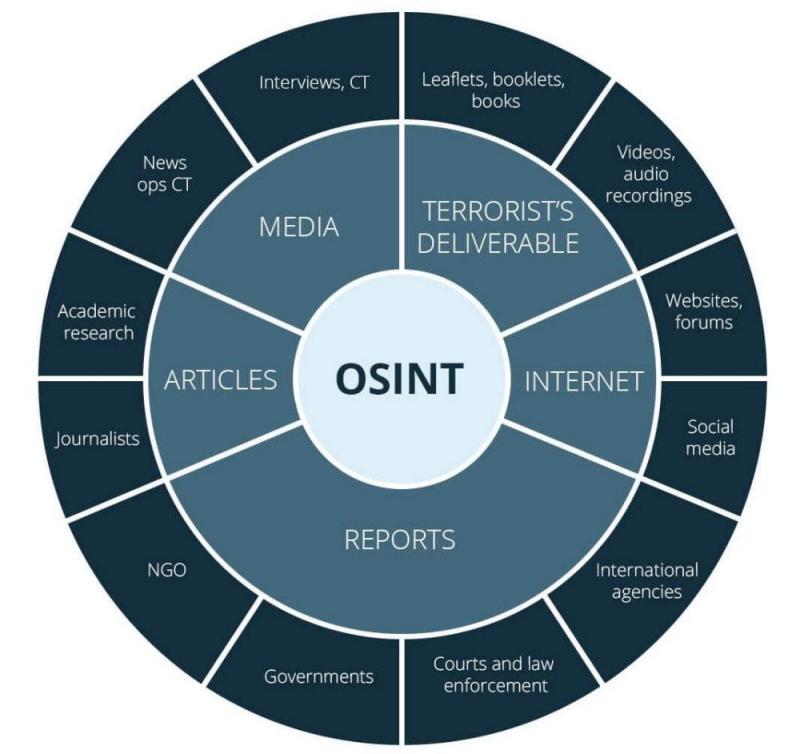What is open source intelligence?

What is open source intelligence?
Open source
intelligence(OSINT), is intelligence generated from publicly available information
that is collected, exploited and disseminated to appropriate audiences in a timely
manner to meet specific intelligence needs. OSINT includes all publicly accessible
sources of information that can be found online or offline, including but not
limited to:
1.Internet, including online publications, blogs, social media websites.
2.Traditional mass media, including television, radio, newspapers, books, magazines, professional journals, academic publications, dissertations, company news, employee profiles, resumes and geospatial information in maps and commercial imagery.
3.Dark web resources.
The process of OSINT is planning, data mining, analysis, dissemination and to generate visual information sorting reports.
As early as in the 1990's, some scholars proposed that national intelligence work
should change to attach importance to intelligence sharing and open source
intelligence, replacing traditional secret intelligence work.
Advantages of open source intelligence
Open
source intelligence has many advantages, including:
Inexpensive: For small or private companies, the tools and technology to
collect data on a regular basis may prove to be too much of an investment. Open
source intelligence comes from public information, including the Internet, media,
social media, government departments, etc. This information is easy to obtain, so
its acquisition cost is very low.
Legality: Since the collected information
has not been defined as confidential and has been publicly disclosed with the
consent of the original source, it is perfectly legal to collect any data you may
find.
Time-sensitive: Due to the public nature of resources used in open
source intelligence, users add and update their information on a regular basis, so
it is highly time-sensitive and reflects the current situation in a timely manner.
Large amount of information: Open source intelligence contains a large
amount of information, including time, place, people, events, etc., which can
provide great help for subsequent analysis.
The unique value
of open source intelligence
Open source intelligence is
commonly used in a range of sectors, including the military, federal agencies, law
enforcement, insurance, private investigation, and the legal sector. Each of these
agencies relies on open source intelligence(OSINT) for different purposes and is
influenced by publicly available information for their particular work.
For
example, law enforcement agencies use OSINT to help apprehend criminals and disrupt
crime, including but not limited to cybercrime, fraud, violent crime, and terrorism.
Criminal investigators use OSINT to find information about their subjects
and to detect illegal activity online.
Financial intelligence teams use
OSINT as a starting point in money laundering and embezzlement cases, track
cryptocurrency addresses during digital currency forensics, and assist in identity
theft cases.
Business intelligence teams rely on OSINT to identify target
audiences, perform competitive analysis, and make brand protection cases.
Cybersecurity
professionals use OSINT for threat analysis, penetration testing, and hacking.
Recommended open source intelligence monitoring
system
As a leader in the web intelligence monitoring,
Knowlesys International Ltd.(Knowlesys) has accumulated 10 years of experience in
OSINT monitoring and the experience of analyzing and processing thousands of
different types of websites and mobile applications.
Founded in May 2003,
Knowlesys is a high-tech company that specializes in Internet information
processing. It has established rich experience and competitive advantages in the
fields of accurate monitoring and vertical mining of mass information on the
Internet. The core products are
Knowlesys Intelligence
System and Knowlesys Web Data Miner Studio. Knowlesys Intelligence System is
developed based the world's leading OSINT extraction technology, with the advantages
of quick identification and full coverage. It enables users to monitor the entire
web and identify important information and negative public opinions in a timely
manner.